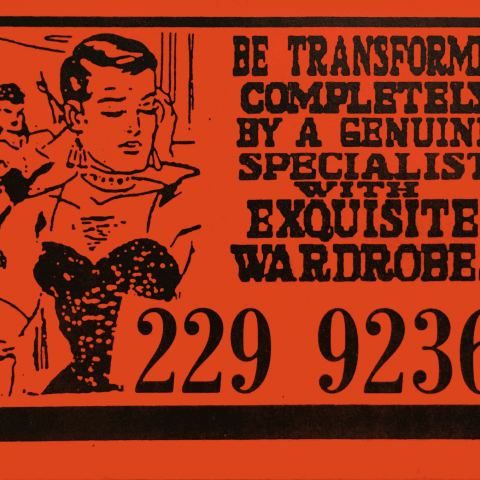Finding Gender Affirming Services in the Phone Booth
Olivia VF Chaudhury, Class of 2022, M.A. Historic Preservation Planning
These three cards (click to zoom in), used to advertise gender affirming services, were displayed in telephone booths in London, United Kingdom, circa 1991-2006. “Tart cards,” or sex work solicitation cards, advertised myriad sexual services including BDSM and role play. Printed on cheap paper featuring simple block designs often against neon backgrounds, the cards were displayed on the walls of telephone booths. The majority advertised cisgender and heterosexual services, but many advertised for “transvestite” and “transsexual” services.
“T.V.” stands for “transvestite,” a catch-all term in the early 1990s meaning a person assigned male at birth who explored other gender identities. During this time period, there were few spaces where transgender and gender non-conforming people could safely express their gender identities. These cards advertise “wardrobe services,” meaning safe spaces where clients could explore clothing, makeup, wigs, etc. according to Dr. Kate Lister, historian of sex work.
The specialists offering “T.V. instruction” pledged to make their customers “look and feel feminine.” Some “T.V. services” offered a dominant/submissive exchange – what kink terminology would call “forced feminization” or “sissification” today. But often, as advertised here, “T.V. services” were paid safe spaces for closeted transgender women to express their gender.
Source
Prostitute advertising cards, circa 1991-2006. Ayres, Matt, n.d. Cornell Human Sexuality Collection #7743, Box 1, Folder: Transvestite, Transgender, Division of Rare and Manuscript Collections, Cornell University Library
https://rmc.library.cornell.edu/EAD/htmldocs/RMM07743.html
Bibliography
Lister, Kate. “Dial ‘S’ For Sex.” Wellcome Collection. Wellcome Collection, October 17, 2018. https://wellcomecollection.org/articles/W6NvHSoAACYA0A72.




